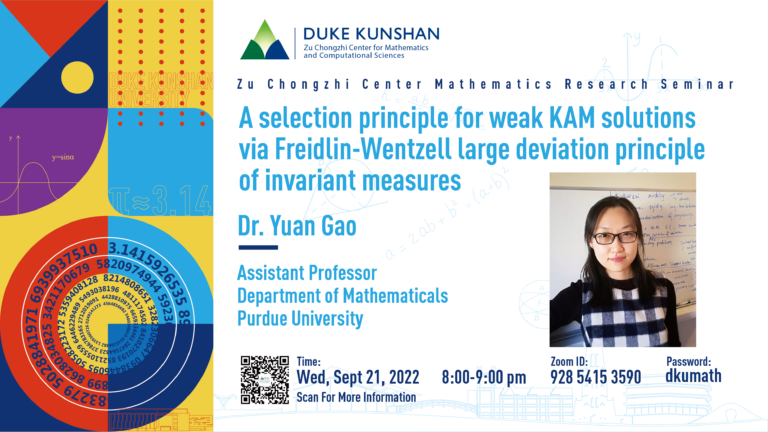Start
End
Location
Type
Share
Event details
Zu Chongzhi Center Mathematics Research Seminar
Date and Time(China standard time): Wednesday, September 21, 8:00-9:00pm
Zoom ID: 928 5415 3590
Passcode: dkumath
Title: A selection principle for weak KAM solutions via Freidlin-Wentzell large deviation principle of invariant measures
Speaker: Yuan Gao
Bio: Dr. Yuan Gao is an assistant professor at the Department of Mathematics, Purdue University. Before joining Purdue in 2021, she was a William W. Elliott Assistant Research Professor at Duke University during 2019-2021. She received her PhD from Fudan University in 2017. Yuan Gao specializes in calculus of variation and numerical analysis for singular nonlinear PDEs rising from crystalline materials, image sciences and microfluids. Her recent research interests are optimal control and Hamilton-Jacobi equations with applications in dynamic system, and non-equilibrium chemical reactions.
Abstract: We will give a gentle introduction of weak KAM theory and then reinterpret Freidlin-Wentzell’s variational construction of the rate function in the large deviation principle for invariant measures from the weak KAM perspective. We will use one-dimensional irreversible diffusion process on torus to illustrate some essential concepts in the weak KAM theory such as the Peierls barrier, the projected Mather/Aubry/Mane sets. Freidlin-Wentzell’s variational formulas for both a self-consistent boundary data at each local attractors and for the rate function are formulated as the global adjustment for the boundary data and the local trimming from the lifted Peierls barriers. Based on this, we proved the Freidlin-Wentzell’s rate function is a weak KAM solution to the corresponding stationary Hamilton-Jacobi equation satisfying the selected boundary data on projected Aubry set, which is also the maximal Lipschitz continuous viscosity solution. The rate function is the selected unique weak KAM solution and also serves as the global energy landscape of the original stochastic process. A probability interpretation of the global energy landscape from the weak KAM perspective will also be discussed.



